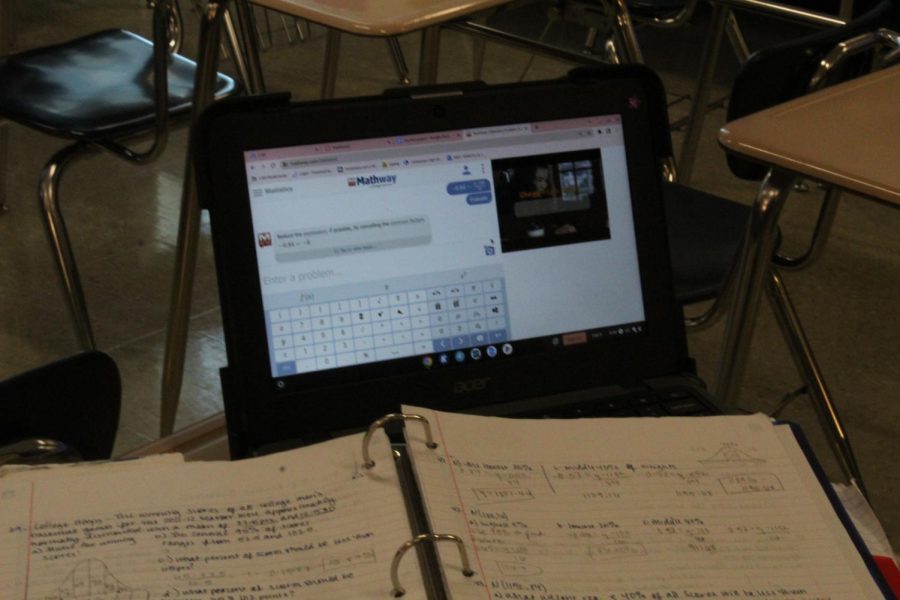Opinion: Artificial Intelligence Programs Lead To Cheating, School District Needs To Address
Websites like Mathway help students to cheat on math assignments, helping them get better assignment grades, but doesn’t help with test grades because they don’t actually understand the material.
February 9, 2023
Within the past few years, artificial intelligence technology has improved exponentially. From being able to plaster celebrity faces onto the average Joe with deepfake AI, to being able to generate images from written prompts with AI art programs such as DALL-E, it was only a matter of time before AI made its way into the classroom. But not in the positive way that educators would hope. High school students have found a new way to cheat that isn’t writing answers down on the palm of their hands, but rather with the help of artificial intelligence, while educators stay blissfully unaware. The usage of AI programs in schools will undoubtedly lead to a high uptick of students passing their assignments, but flunking their tests.
To fully understand the gravity of the situation people must first understand why, how, and what students use to cheat on assignments. For the sake of clarity, let’s divide this into two sections on the two main subjects students will want to cheat on: mathematics and English. When it comes to math and AI, there’s an abundance of resources. After all, some of the first skills AI learned were math since AI at it’s core is basically a computer with a calculator installed into it. Some of the most popular AI programs for math are Photomath and Mathway. Both of these programs work the same fundamentally. People have the option to take a photo of a math problem or type it in themselves. Usually the program will ask how a person wants to solve it. For example, “do you want to solve for x or for y?” Once these simple steps are completed the program will supply a person with not only the answer, but steps on how to solve for it. Because of this, faking showing work is easier. Now these apps aren’t without their flaws but more likely than not, the right answer will appear, leaving an easy and convenient way for students to get assignments done and out of the way.
When it comes to AI resources for English it gets more complicated. Many document programs have spell check built into them, but most people wouldn’t necessarily call that cheating. But it does become cheating when the essay manages to write itself. With programs like ChatGPT, adding just a few sentences for a prompt can lead to robots writing more than 10 page long essays. Students can then just copy and paste these essays into a document and submit the assignment. Little to no effort required. But unlike math resources that are almost impossible to prove if a student has used them, writing programs like ChatGPT end up faulting from their coding. With writing programs, they learn from a database of already written content, this sometimes causes them to copy directly from these sources, leading to obvious plagiarism. If teachers put these essays through plagiarism detectors then they’ll be able to tell easily if the essay is made by AI, which leads to an easy fix for English based AI.
Unfortunately, math sources are ten times more popular than literature and writing sources, and much harder to prove the use of. A step in the right direction is to block these websites, because sites like Mathway, Symbolab, and Photomath are still accessible on school Chromebooks. While app versions of these for mobile phones still exist, the district should do everything in their power to prevent cheating within their ability instead of turning a blind eye to it.
Cheating is obviously showing a lack of academic integrity, but it’s a much greater issue than previously presented. During the COVID-19 pandemic, sites like Mathway and ChatGPT thrived because students were desperate to understand their assignments and not fall behind. Now coming off of those times where everyone was working from home, students can’t give up these programs because it’s addicting. Programs like these are able to give students instant gratification. Students would much rather put no work in for a high grade than pour their heart into it for a low grade. The use of these programs are dividing the educational gap, students who genuinely try but still receive low grades are scolded while others fake being the perfect student and get away with it. In addition, educators have no real way of knowing if students are actually on grade level or advancing. And on a wide scale, state education boards who mandate standards like STAAR and TEKs base them off of current information from school districts. The influx of cheating will lead to harder lesson plans being pushed onto teachers to teach, and then incentivize students to cheat even more.
We must stomp out cheating at its root before the problem exceeds what school districts can do. By blocking these websites from school Chromebooks, schools can stop one way students cheat. Furthermore, teachers should really truly care about feedback from their students. Are the lessons moving too fast and increasing in difficulty before students can truly learn the material? If students can feel seen and safe academically, then they are less likely to cheat. If schools reward students for trying even if they don’t make high grades, then students will learn properly. By ceasing the assigning of worth to numbers and grades, not only will this cease cheating but it will ultimately teach students one of the hardest lessons of all, to love oneself for who they are.

